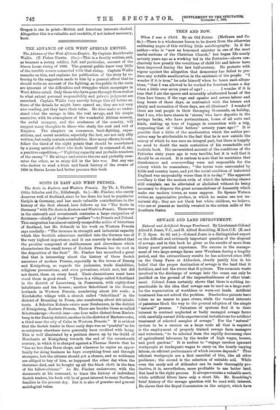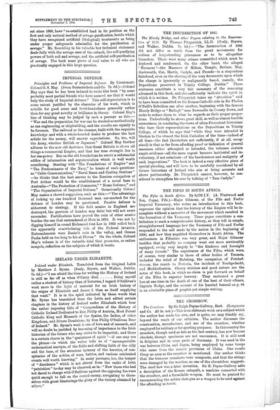SEWAGE AND LAND IMPROVEMENT.
Natural and Artificial Sewage Treatment. By Lieutenant-Colonel Alfred S. Jones, V.C., and H. Alfred Roechling, M.Inst.C.E. (E. and F. N. Spon. 3s. 6d. net.)—Colonel Jones is a distinguished expert on the difficult and extremely important question of the disposal of sewage, and in this book he gives us the results of more than thirty years' practical experience. His success in the manage- ment of two large sewage farms near Wrexham during a lengthy period, and the extraordinary results he has achieved since 1895 on the Camp Farm at Aldershot, clearly justify him in his belief that the proper destination of sewage is the land that it fertilises, and not the rivers that it poisons. The economic waste involved in the discharge of sewage into the ocean can only be justified on the ground of the impracticableness of other treat- ment. Colonel Jones certainly shows that there is nothing im- practicable in the idea that sewage can be used on a large scale for the regeneration of worthless or worn-out lands. Artificial treatment has not solved the problem. Numberless patents have taken us no nearer to pure rivers, while the vested interests of patentees block the way to the general adoption of the simple "natural" process. "Patentees of systems find it to their interest to contrast neglected or badly managed sewage farms with carefully nursed little experimental installations for artificial treatment of selected samples of sewage." For the "natural" system to be a success on a large scale all that is required is the employment of properly trained sewage farm managers and watermen, "to be selected from the rapidly decreasing class of agricultural labourers by the tender of high wages, houses, and good gardens." It is useless to "engage careless ignorant workpeople at inadequate wages to carry on the hourly varying labour, on efficient performance of which success depends." Thus efficient workpeople are a first essential of this, like all other problems ; the second is the selection of suitable soil. While even the sandy soil of Aldershot can be made thoroughly pro- ductive, it is, nevertheless, more profitable to use better land. But land is the right process. It always remains a valuable asset, while artificial filters have only a short life. Mr. Roechling's brief history of the sewage question will be read with interest. He shows that the Royal Commission on the subject, which have
sat since 1898, have "re-established land in its position as the first and only natural method of sewage purification, beside which they have recognised artificial (biological) treatments as being under proper safeguards admissible for the purification of sewage." Mr. Roechling in his valuable but technical statement deals fully with the sewage uses of the subsoil, the self-purifying powers of both soil and sewage, and the artificial self-purification of sewage. The book must prove of real value to all who are practically engaged in this large question.































































 Previous page
Previous page